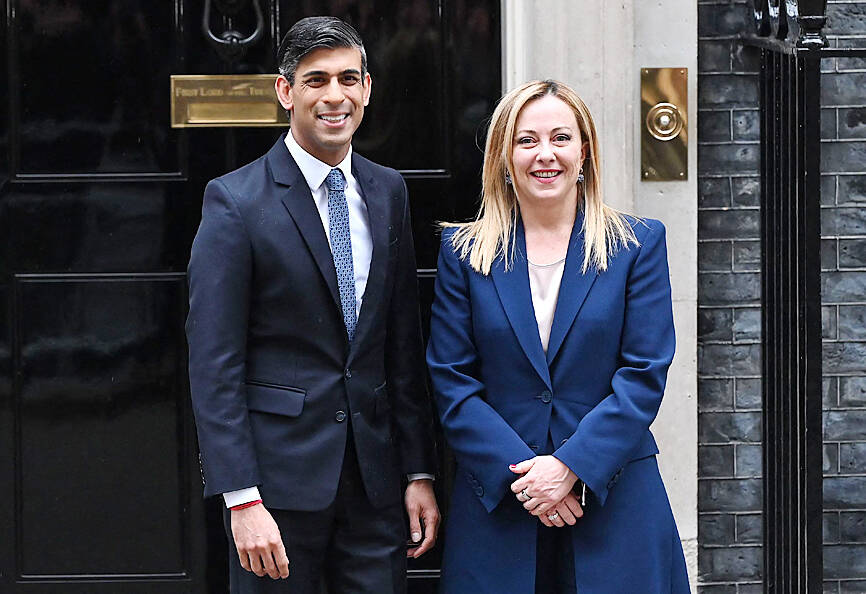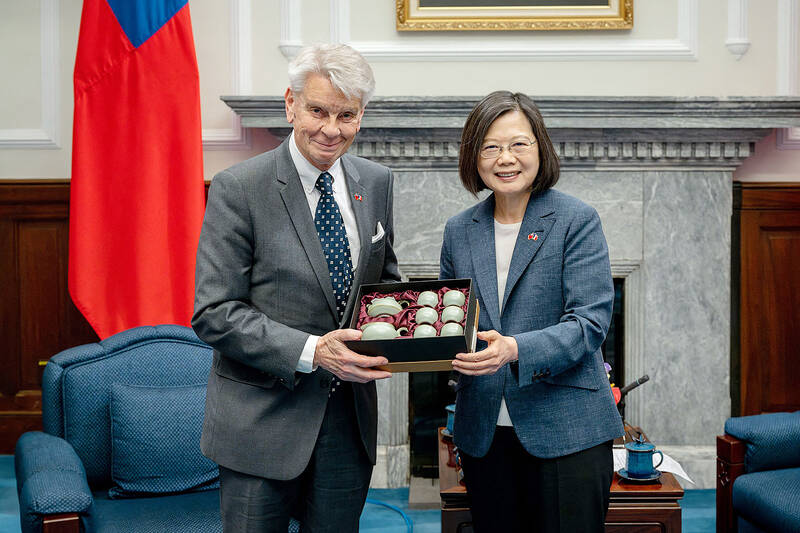British Prime Minister Rishi Sunak and Italian Prime Minister Giorgia Meloni stated their support for peace and stability in the Taiwan Strait in a memorandum of understanding signed on Thursday.
“We reaffirm the importance of peace and stability across the Taiwan Strait and encourage the peaceful resolution of cross-Strait issues without the threat or use of force or coercion,” the two leaders said in the agreement signed during their meeting at the British prime minister’s official residence at 10 Downing Street in London.
“We reaffirm our shared opposition to unilateral changes to the status quo,” they said. “We will coordinate to uphold the rules-based international order, particularly on our concerns regarding the challenges posed by state actors.”

Photo: AFP
They also voiced concerns about China’s human rights violations and abuses in Xinjiang, Tibet and Hong Kong, calling on Beijing to act responsibly as a permanent member of the UN Security Council.
In Taipei, the Ministry of Foreign Affairs yesterday welcomed the statement, saying that the UK and Italy have repeatedly supported peaceful measures in the Taiwan Strait.
This can be seen in the British policy report Review Refresh 2023, as well as a speech British Secretary of State for Foreign, Commonwealth and Development Affairs James Cleverly made on Tuesday, the ministry said.

Photo: AFP, via the Taiwan Presidential Office
Cleverly said that a Chinese invasion of Taiwan would destroy world trade, and “no country could shield itself from the repercussions of a war in Taiwan.”
Italy recently sending a naval patrol vessel to the Indo-Pacific region also showed the country’s efforts to help ensure regional stability, it added.
Separately yesterday, French Senate Vice President Alain Richard said in Taipei that the French Parliament is highly concerned about security in the Taiwan Strait and supports the French government’s actions to safeguard the Indo-Pacific region.
The French Parliament backs the government’s efforts to bolster cooperative relations with other countries, including Taiwan, he said at a meeting with President Tsai Ing-wen (蔡英文) at the Presidential Office.
Amid rising global tensions, the French Parliament is also focusing on bolstering mutual trust and cooperation in the field of security, he said.
French lawmakers are greatly concerned about Taiwan’s security and always encourage their government to show its support, he said.
The transit of a French military ship through the Taiwan Strait earlier this month was an example Richard cited of his country’s engagement in the region.
Richard and his delegation, which comprises members and staff of the France-Taiwan Parliamentary Friendship Group, concluded their five-day visit to Taiwan yesterday.
The visit is being made to demonstrate France’s friendship with Taiwan and show its respect for the Taiwanese government, Richard said.
The progress Taiwanese have made in promoting human rights and democracy is laudable, Richard added.
France and Taiwan have been working closely together on various projects for years, which has drawn the attention of more French citizens to Taiwan, he said.
Tsai thanked Richard for helping deepen ties between the two nations.
The World Taiwanese Chambers of Commerce meeting that took place in Paris earlier this month showed the close cooperation between Taiwan and France in economy and trade, she said.
A joint statement issued after the G7 Foreign Ministers’ Meeting, which was held in Japan from April 16 to Tuesday last week, also highlighted the importance of peace and stability across the Taiwan Strait, and its support for Taiwan’s international participation, she said.
Taiwan will continue to improve its relations with France to achieve more fruitful results in several fields, she said.

The CIA has a message for Chinese government officials worried about their place in Chinese President Xi Jinping’s (習近平) government: Come work with us. The agency released two Mandarin-language videos on social media on Thursday inviting disgruntled officials to contact the CIA. The recruitment videos posted on YouTube and X racked up more than 5 million views combined in their first day. The outreach comes as CIA Director John Ratcliffe has vowed to boost the agency’s use of intelligence from human sources and its focus on China, which has recently targeted US officials with its own espionage operations. The videos are “aimed at

STEADFAST FRIEND: The bills encourage increased Taiwan-US engagement and address China’s distortion of UN Resolution 2758 to isolate Taiwan internationally The Presidential Office yesterday thanked the US House of Representatives for unanimously passing two Taiwan-related bills highlighting its solid support for Taiwan’s democracy and global participation, and for deepening bilateral relations. One of the bills, the Taiwan Assurance Implementation Act, requires the US Department of State to periodically review its guidelines for engagement with Taiwan, and report to the US Congress on the guidelines and plans to lift self-imposed limitations on US-Taiwan engagement. The other bill is the Taiwan International Solidarity Act, which clarifies that UN Resolution 2758 does not address the issue of the representation of Taiwan or its people in

US Indo-Pacific Commander Admiral Samuel Paparo on Friday expressed concern over the rate at which China is diversifying its military exercises, the Financial Times (FT) reported on Saturday. “The rates of change on the depth and breadth of their exercises is the one non-linear effect that I’ve seen in the last year that wakes me up at night or keeps me up at night,” Paparo was quoted by FT as saying while attending the annual Sedona Forum at the McCain Institute in Arizona. Paparo also expressed concern over the speed with which China was expanding its military. While the US

SHIFT: Taiwan’s better-than-expected first-quarter GDP and signs of weakness in the US have driven global capital back to emerging markets, the central bank head said The central bank yesterday blamed market speculation for the steep rise in the local currency, and urged exporters and financial institutions to stay calm and stop panic sell-offs to avoid hurting their own profitability. The nation’s top monetary policymaker said that it would step in, if necessary, to maintain order and stability in the foreign exchange market. The remarks came as the NT dollar yesterday closed up NT$0.919 to NT$30.145 against the US dollar in Taipei trading, after rising as high as NT$29.59 in intraday trading. The local currency has surged 5.85 percent against the greenback over the past two sessions, central